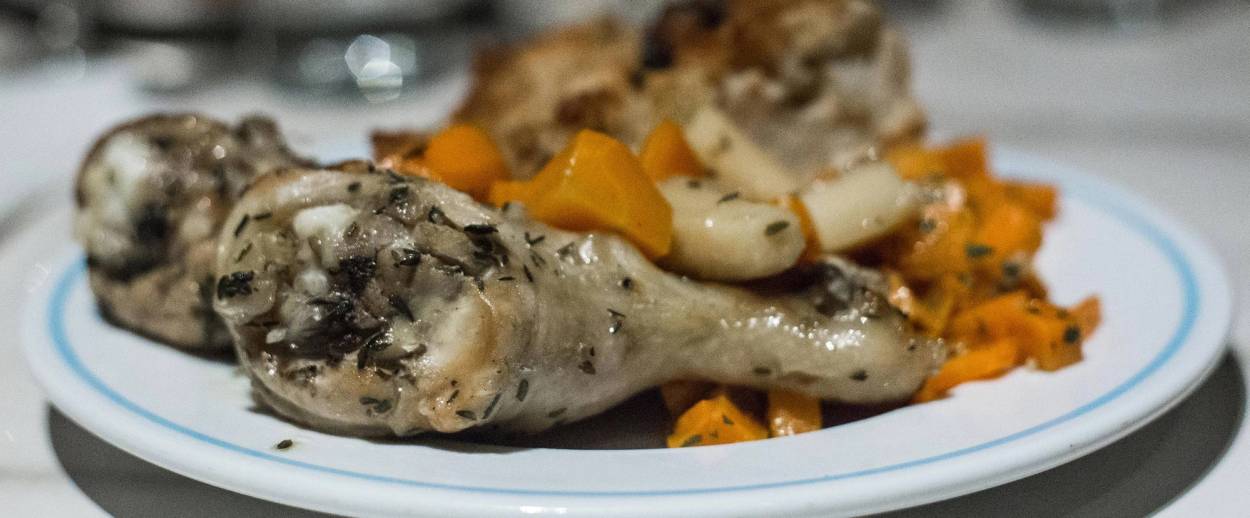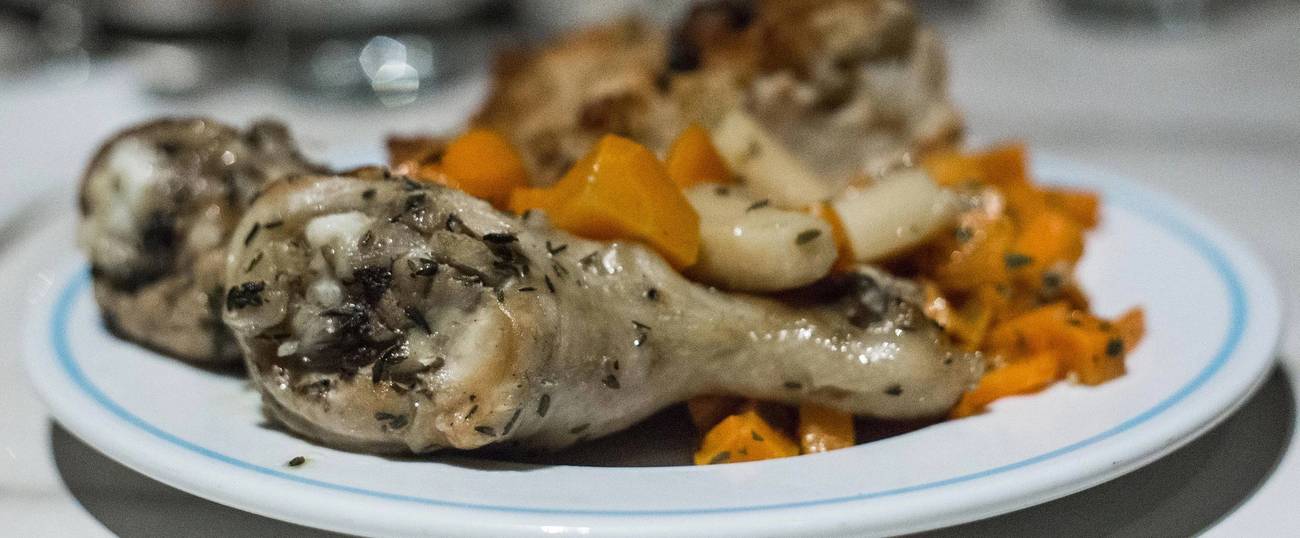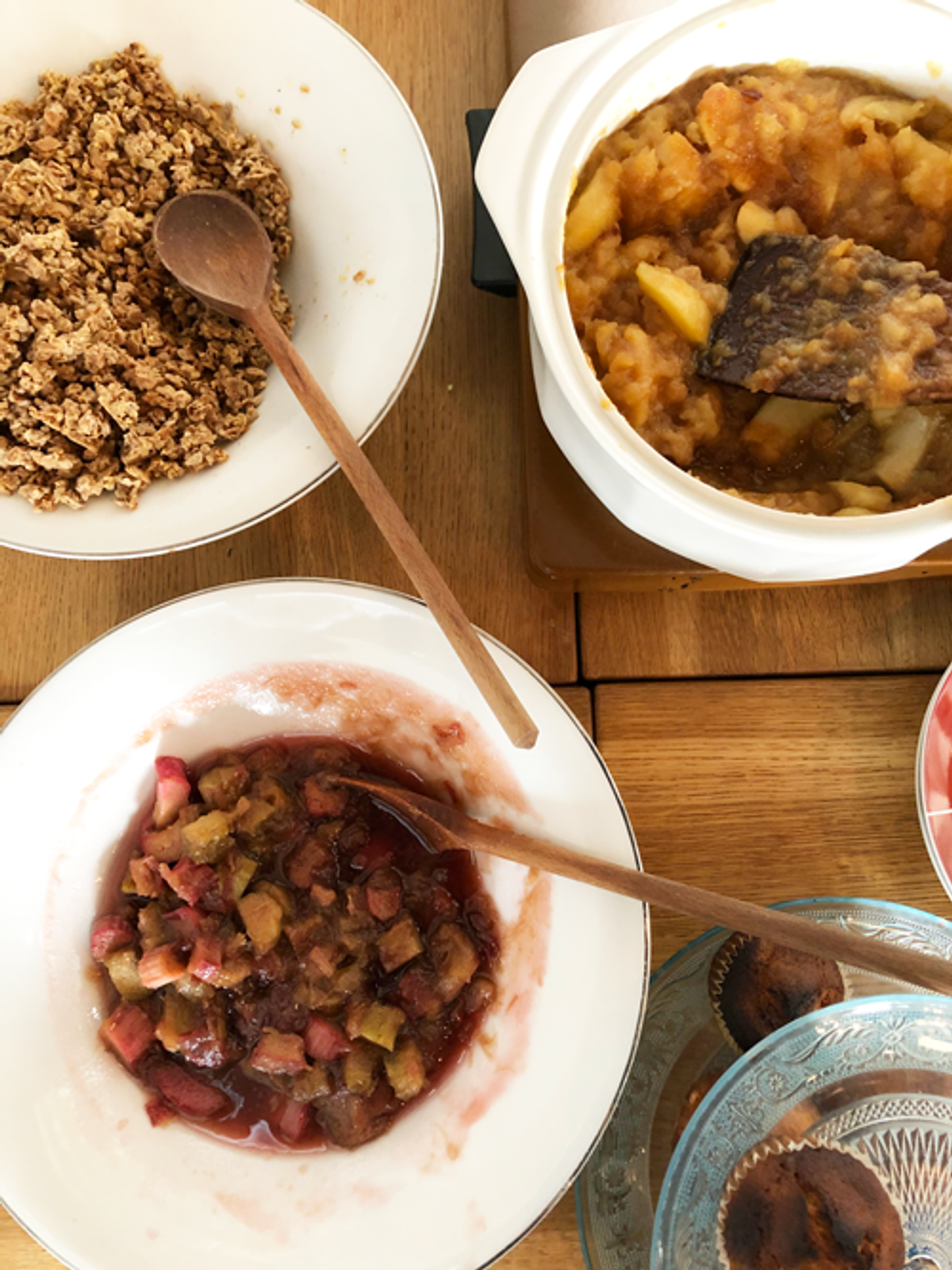Jewish Food Returns to Warsaw
Israeli cuisine finds fans in the Polish capital. But can traditional Ashkenazi cuisine return to the place where it once flourished?




Sunday brunch at Boker Tov, the cafe at JCC Warsaw, is quite a scene. Every table in the sunlit space is packed elbow-to-elbow wiath the city’s young and fashionable. Coffee flows, conversations bubble and overlap, and for 25 zlotys (about $6.50), a spread of porridge with apple compote, roasted eggplant and squash with harissa, shakshuka, challah pudding, and pickled-onion-topped potato salad is continuously refreshed.

For the JCC’s CEO, Agata Rakowiecka, Sunday morning’s chaotic energy is the whole point. “I want people to come when we open and stay all afternoon,” she said. A Jewish native of Warsaw, she founded the JCC, together with the JDC, in 2013 with a goal of reclaiming a sliver of the city’s vibrant Jewish past—and she embraces an open-door philosophy. Boker Tov’s windows are floor-to-ceiling by design and help the space radiate a sense of welcoming and warmth. (The organization’s offices and classroom spaces are located above the cafe.) Many, if not most, of Boker Tov’s patrons are not Jewish, but they are there to experience Jewish culture and cuisine in a city where neither has flourished in many decades.
About a mile away, a restaurant called Tel Aviv Urban Food draws large and adoring crowds. Run by entrepreneur and local food celebrity Malka Kafka, Tel Aviv offers vegan Middle Eastern-inspired street fare. There’s meat-free shawarma with amba, sambousak dumplings with green peas, mint, and lentils, more than a half dozen different takes on shakshuka (where dolmas and falafel stand in for the eggs), and even more takes on hummus. The wine list is organic and the drinks menu includes the classic Tel Aviv elixir, lemonana (mint lemonade).
Kafka’s restaurant helped spark a vegan food craze in Warsaw—a trend that began percolating about a decade ago, according to food writer and culinary curator Monika Kucia. In tandem with a growing awareness around climate change and how people’s food choices can affect their environmental footprint, “Tel Aviv [the city] became a fascinating destination for Europeans,” Kucia said. Tel Aviv (the restaurant) caters to both interests. “Hummus is now available on every corner,” she said. Warsaw’s fascination with Middle Eastern cuisine via Israel mirrors similar trends in other European cities like Berlin and Krakow.
Jewish, particularly Middle Eastern, food is now widely available in Warsaw. But less available have been restaurants that highlight traditional Polish Jewish cuisine as it existed before WWII. Challah, for example, is widely eaten; the Polish version is sweeter than traditional Ashkenazi challah, and typically consumed at breakfast with coffee, akin to a croissant or scone. “The Jewish connection to the bread has been almost completely lost,” Kucia said. “[There isn’t the same interest in] the old Ashkenazi food, I am afraid.”
That may be changing. When I visited Warsaw this fall, I came for TISH, an annual food festival hosted by the POLIN Museum, which focuses on Polish Jewish history. Last year Aleksander Baron—a Warsaw-based chef who is known for exploring Poland’s traditional cuisines—partnered with the festival on a lavish meal featuring upscale interpretations of Old World Polish Jewish fare. There was a sour soup made with duck cracklings, fire-roasted goose with apples, red cabbage, and slivovitz, and a challah-based kugel with walnuts, raisins, and a poppy-honey sauce.
This year’s festival was centered around the concept of home, and included a challah-baking class (where the bread’s Jewish roots were explicit) and a vegan Jewish brunch hosted by Kafka that served a variety of meat-free versions of Ashkenazi dishes like tzimmes and chopped liver. Pastry chef Laurel Kratochvila of Berlin’s Fine Bagels also baked an array of hand-rolled bagels, eier kichlach (bowtie-shaped egg cookies), and rugelach for the brunch.
I was there to facilitate a home-inspired Shabbat dinner for TISH at Charlotte Menora, a Jewish cafe created with support from POLIN. During the day, Charlotte Menora serves a young and beautiful clientele omelets and cappuccinos—but also baked goods like poppy seed cookies, rugelach, sugar-dusted challah, and bagels.
The night of the event, the cafe closed to the public to host a sold out crowd for Shabbat dinner, featuring recipes from my global Jewish recipe collection, The Jewish Cookbook. The dishes served were a mix of Ashkenazi classics—roasted chicken, pear and plum kugel, honey cake, and Hungarian egg and onion spread—and Sephardi dishes like Moroccan roasted carrots and marak katom (Israeli “orange soup”). But the gathering of more than 80 people together in a room to light candles, toast l’chaim, and celebrate Shabbat dinner in Warsaw felt quietly staggering. For generations, this was what Jewish life in Warsaw felt like. Now, it was a novelty.
There are currently about 10,000 people who identify as Jewish living in Poland (a tiny fraction of the country’s prewar Jewish population of 3.5 million) and more with Jewish ancestry they may not know about or identify with. “It can be difficult to know who is who,” Rakowiecka admitted. Taken together, the popularity of restaurants like Boker Tov, Tel Aviv Urban Food, and Charlotte Menora—as well as the thriving TISH Festival—point toward a resurgence of interest in Jewish life, particularly by younger, urban Poles. Nearly 75 years after the Holocaust and 30 since the fall of communism, the city’s Jewish population is connecting back to its roots, and non-Jewish allies are exploring the gap that was left in the wake of the decimation of the city’s Jewish community.
At the same time, the effect is mitigated by the current resurgence in anti-Semitism across Europe—and particularly in Poland, where a nationalist government has formally attempted to distance Poland from the horrors of the Holocaust. Which version of Warsaw’s future ultimately prevails remains to be seen. But for Rakowiecka and Poland’s growing Jewish community, it is clear that the path forward must be paved with joy, celebration of heritage, and—of course—delicious food.